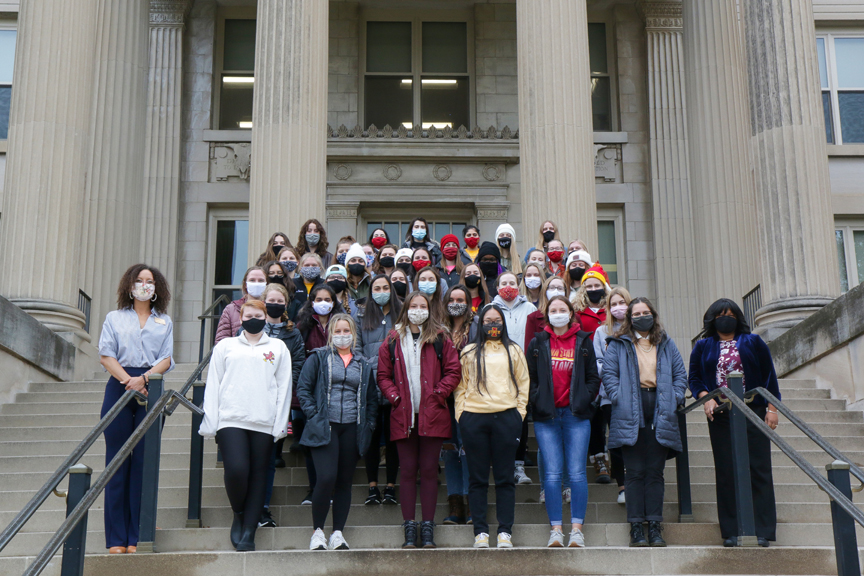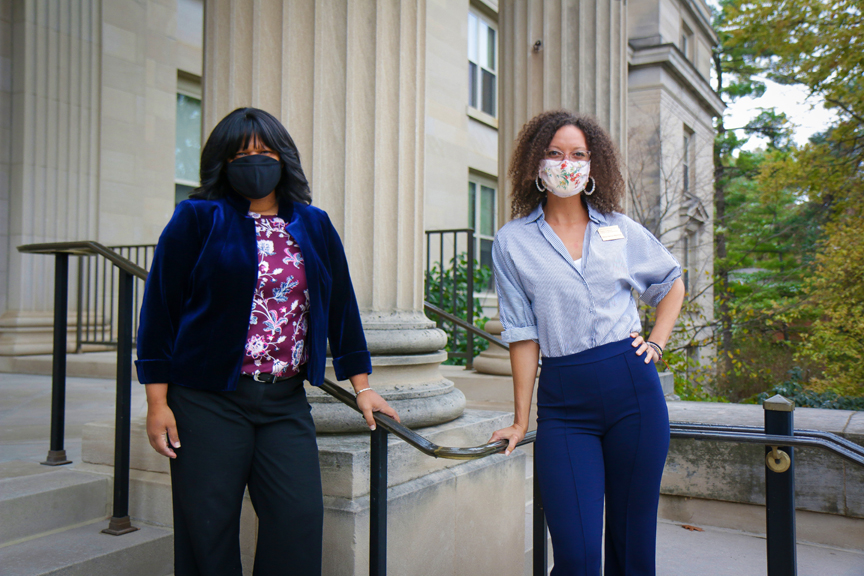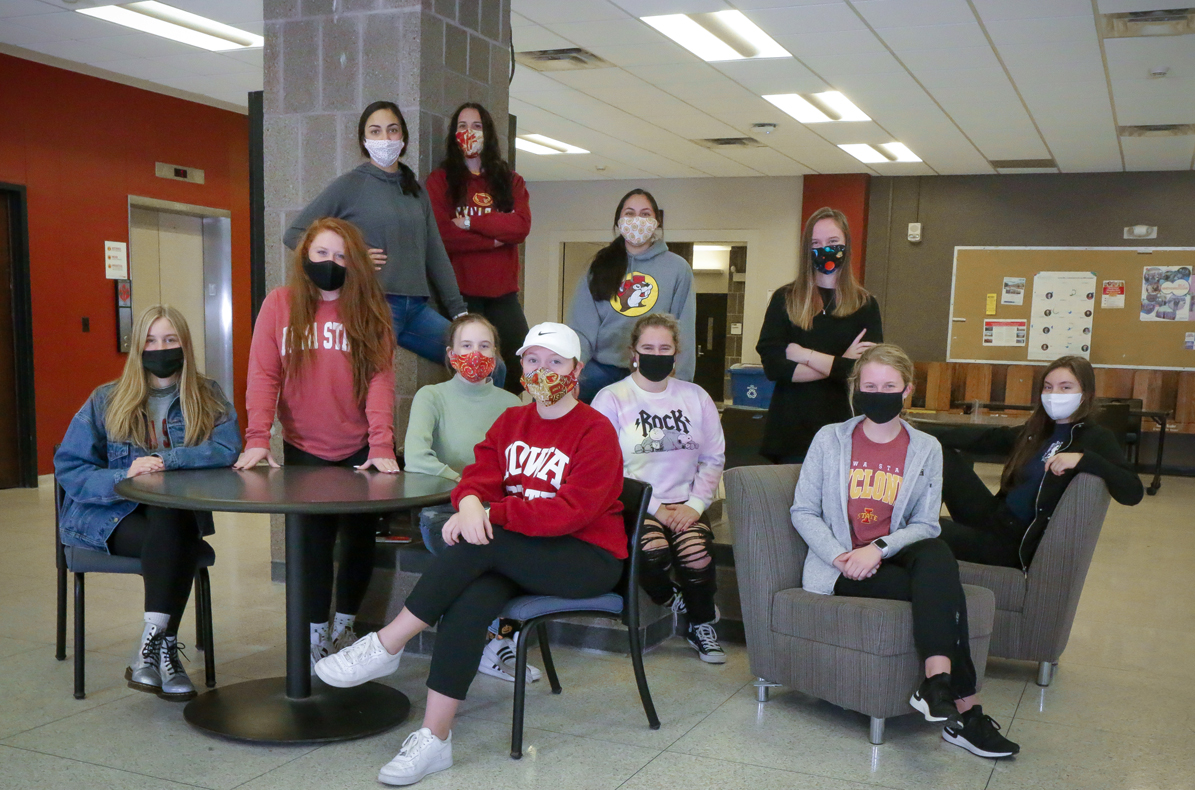The number of women who pursue careers in science, technology, engineering and mathematics (STEM) fields continues to lag behind men, even well into the 21st century. According to the U.S. Department of Commerce, women filled 47% of all U.S. jobs in 2015, but held only 24% of STEM jobs. In the same year, women accounted for only 30% of STEM degree holders.
Seven years ago, statistics like this prompted the directors of Iowa State University’s Women in Science and Engineering (WiSE) Program to partner with the Leadership Studies Program in the College of Liberal Arts and Sciences to offer first-year female STEM majors a three-credit course called Leadership Through Service (LD ST 291B). The class offers a comfortable, empowering space in which women share their unique ideas and perspectives while learning how to lead with confidence and compassion.
“The purpose of this class is to provide community and support but also to ground the students’ leadership journey in equitable principles,” said Monic Behnken, director of the Leadership Studies Program, associate professor of sociology and the course’s instructor. “Iowa State University understands that we have an obligation to train future leaders to address the issues of our time, and this focus on equitable leadership is the piece that I think is missing from a traditional leadership education.”
A WiSE choice
The class helps WiSE fulfill a mission to provide women in STEM majors with opportunities to grow their personal and professional potential. Alicia Herron-Martinez, WiSE program coordinator, said the course gives students the confidence to speak up in the classroom, which carries over into their careers.
“The purpose of this class is to provide community and support but also to ground the students’ leadership journey in equitable principles.”
“Fundamentally, we serve students who look around in a large lecture and they may be the one or two female-identifying individuals in the classroom,” Herron-Martinez said. “They battle impostor syndrome, they don’t feel like they belong. There are a lot of different cultural barriers that may inhibit some of their power, so we’re here to empower and support them.”

Sydni Hostetter is a first-year genetics major and leadership studies minor who deems this course a life-changing experience. She appreciates the opportunity to openly share her thoughts and ideas, especially with other women in STEM.
“While the challenges as women in STEM have been acknowledged by the larger society, that hasn’t changed the experience. We are still sitting in classes full of men, struggling to get our voices heard,” Hostetter said. “This class is an opportunity to learn how to adapt and analyze the real underlying themes that occur in these moments of underrepresentation.”
Course curriculum
To promote physical distancing due to the COVID-19 pandemic, this semester’s course was capped at 60 students; 100 or more female-identifying students usually take the class. Classes are held in-person twice a week with lectures and guest speakers on Mondays followed by small-group sessions on Wednesdays. Behnken leads the Monday class, and 12 peer facilitators conduct six small groups called nests, a nod to WiSE’s owl logo.
Behnken said companies and organizations across the nation are continually challenged with how to best work with those who have diverse perspectives on a variety of topics. The class’s curriculum focuses on teaching students how to navigate complicated interpersonal dynamics.

“Because relationships really underlie any effective leadership, we are teaching the students how to connect with people who have identities different than them,” Behnken said.
Students learn how the overlapping of various social identities, such as race, gender, sexuality and class, may promote discrimination and oppression. They talk about racial and ethnic identities, nationalities and the LGBTQ identities, which helps students learn how to connect with individuals who may have different experiences from them.
“What really differs about this class from other leadership classes is that we aren’t learning how to write emails to our peers or how to craft a good speech. Instead, we focus on the real human experience and specifically the experience we share as women in STEM.”
Each week, Behnken presents a theme that is paired with a guest speaker who brings clarity and expertise to the subject. Topics include leadership, allyship, entrepreneurship and innovation, moral and ethical decision-making, and resistance to equitable practices. The small groups delve deeper into the topics and build lasting relationships in the process.
“The small groups get super tight by the end of the semester, and we hear from students that they’ve created life-long friendships,” Herron-Martinez said. “Those groups help the students develop and ground themselves, and become more aware of who they are.”
That has certainly been the case for Hostetter.
“What really differs about this class from other leadership classes is that we aren’t learning how to write emails to our peers or how to craft a good speech,” she said. “Instead, we focus on the real human experience and specifically the experience we share as women in STEM.”
Ready to lead
Behnken and Herron-Martinez believe this course prepares students to take the reins early in their careers.
“They are ready on the very first day to go into a meeting or a community event understanding complicated dynamics, which might take someone who hasn’t had this training months, maybe even years, to understand,” Behnken said.
“Our students in the STEM fields will need to impact, influence and see the change that we need in order to solve those complex issues in the real world,” Herron-Martinez said. “This class helps them be better equipped to do so on day one.”
At the conclusion of the semester, Behnken hopes the students walk away from this course not only with a deeper understanding of equitable leadership, but also with humility and empathy.
“I would love that to be the hallmark of a student’s leadership journey,” she said.
